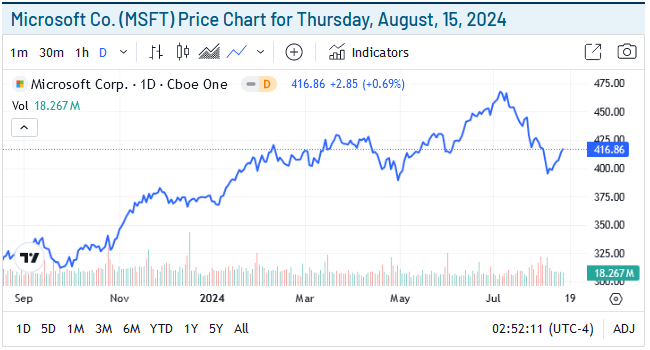Microsoft Stock: Is Now the Time to Buy the Dip After a 20% Drop?
2024.08.15 08:21
- Microsoft’s shares sold off hard through the end of July and the start of August.
- The stock’s RSI fell to its lowest level in nine years, showing how oversold it was.
- Shares are recovering; we expect this to continue in the coming months.
It’s been a funny couple of weeks for investors. After a great start to the year, which saw the rally more than 20%, the first week of August saw some of the worst days for stocks in years.
A poor fueled fears that the Fed might have waited too long to cut rates, then made worse by the unwinding of the long-favored carry trade with the .
Even stocks that had been performing well all year saw the legs cut from under them as investors rushed for the door amid a spike in risk-off sentiment. But this is exactly what can create some .
Take, for example, Microsoft (NASDAQ:). It’s not often that you see a $3 trillion stock drop of nearly 20% in a single month, especially from an all-time high, but that’s exactly what happened with the Washington state-based tech titan.
At the worst of the panic last week, Microsoft had lost all its gains since the middle of January. This would have been a bitter pill for investors to swallow, especially as the company had been performing well fundamentally from quarter to quarter.
Microsoft’s Strong Fundamental Performance
Microsoft’s fiscal Q4 , for example, were released at the end of July, which crossed analyst expectations for both headline numbers. It was also the company’s biggest-ever revenue print and their second-biggest EPS print, the latter landing just a few cents below last year’s record. By many measures, that should have been enough to keep shares rallying through the end of summer and into the final few months of the year.
Even from a valuation perspective, things felt good. A price-to-earnings ratio in the mid-30s, while a tech stock is setting all-time highs, would have been hard to imagine in years gone by.
However, some question marks remained over the company’s forward guidance from that report, which probably didn’t help once the broader market sell-off gathered pace.
For its fiscal Q1, Microsoft is expecting revenue to land somewhere between $63.8 billion and $64.8 billion, which was well below the previously forecasted $65.07 billion. Growth in the company’s Azure cloud unit was also felt to be a little low, even though it was up 30% year on year.
Bullish Outlook for Microsoft
Suffice it to say that all this, combined with the sudden spike in risk-off sentiment, led to Microsoft shares plummeting through the back half of July and the first week of August. However, you can’t help feeling that it was an overreaction.
The company is performing well fundamentally, and the prospects for a Fed rate cut have increased. While its shares are still trading for less than $420, almost every recent analyst update calls for them to be above $500.
Take Royal Bank of Canada, for example, which recently reiterated its Outperform rating and gave Microsoft shares a $500 price target; Morgan Stanley, which gave them a $506 price target; or UBS Group, which gave them a $510 price target. These calls point to a targeted upside of at least 20% from current levels.
Why Microsoft’s RSI Signals a Strong Buying Opportunity
The team at Wedbush reiterated their Overweight rating the other week, as well as their $550 price target, which would have Microsoft shares gaining more than 30%.
Only this week, Wedbush analyst Dan Ives again commented on Microsoft’s underlying strength and the strong potential for gains through the rest of the year and into 2025.
There’s also the technical setup to consider. The stock’s RSI fell to 24 last week, its lowest in nine years, all but confirming that the recent drop is extremely overdone.
Already, Microsoft shares are starting to recover and are up 7% from last week’s low. Don’t be surprised if they make a full recovery and more before the year is out.
Original Post







